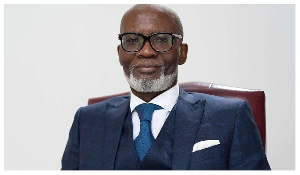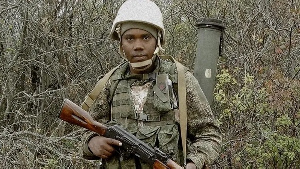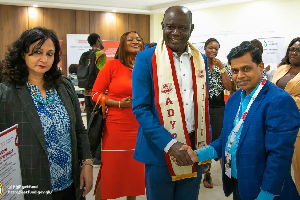Wa, June 9, GNA - Dr Edward Gyader, Medical Director of the Wa Regional Hospital, on Tuesday called on media practitioners to as much as possible refrain from reporting on controversial issues raised by former President Jerry John Rawlings during political and social events. He said such issues when published, created unnecessary tension and apprehension for the larger public.
Dr Gyader made the call, when he presided at World Press Freedom Day celebration, organised by the Upper West Regional Chapter of the Ghana journalists Association (GJA) at Wa.
He said, "Ex-Presidents like Bill Clinton of the United States are living peacefully in retirement with little or no spotlight from the media and this attitude should be applied to our Former Presidents". The Medical Director, who is also the Upper West Regional Chairman of the People's National Convention, said Journalists were well protected by the Constitution and should be bold to practise their profession without fear or favour.
Mr Dominic Bede Donnir, Upper West Regional Director of National Commission on Civic Education (NCCE), who spoke on "Radio - Prospects and Challenges in Nation Building," said issues that could create confusion were not in the public interest and not worth highlighting by media practitioners.
He appealed to moderators of political programmes to avoid exhibiting partisanship on air, since such an attitude could mar the whole electoral process and breed chaos because of radio's position as a powerful tool of mass communication.
Mr Donnir commended the Ghana Broadcasting Corporation for keeping the country united and stable since independence and expressed the hope that the community FM stations being established would emulate it by promoting unity in their operational areas.
Mr Sahanun Mogtari, Upper West Regional Minister, noted that some people deliberately phoned into programmes to raise unnecessary tension on issues that had the tendency to mislead the public to create insecurity, for their own selfish ends.
He called on the Managements of radio stations to institute measures to check that practice, including cutting off such callers from contributing to programmes.
Mr Mogtari expressed regret that some Journalists were hiding behind the freedom, resulting from the repeal of the criminal libel law, to engage in unprofessional behaviour that had tainted the image of the profession and brought it into disrepute.
"Your Association should bring such undesirable characters to book if you have to protect your noble profession and continue to enjoy the confidence of your audience."
Mr Elias Bruttoh, Regional Director of Commission for Human Rights and Administration Justice, said, "journalism like the law profession is not for the timid", and Journalists must be well trained, bold and nationalistic.
Mr George Folley, Regional Vice-Chairman of GJA, reminded media personnel, especially radio presenters in the area of their rights and responsibilities and urged them not to engage in activities that tended to mar journalism as a profession.
He appealed to the management of community radio stations to organise seminars to sharpen the skills of their presenters and reporters.
Regional News of Wednesday, 9 June 2004
Source: GNA












